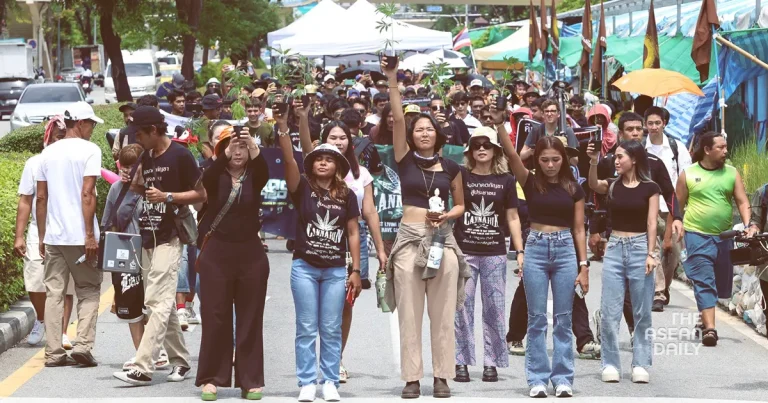11-7-2024 (BANGKOK) Pro-cannabis activists in Thailand have launched a hunger strike in response to the government’s plans to reclassify parts of the cannabis plant as a narcotic substance. The protest comes as the Office of the Narcotics Control Board (ONCB) confirmed that certain cannabis components will be relisted as illegal drugs starting 1 January 2025.
Mana Siriphitthayawat, deputy secretary-general of the ONCB, announced on Wednesday that the board is likely to consider the recriminalisation proposal later this month. If approved, the Minister of Public Health would move to publish the decision in the Royal Gazette, setting the stage for the new regulations to take effect at the beginning of 2025.
The proposed law would prohibit the possession, import, and sale of cannabis flowers and resin without proper licences from the Ministry of Public Health. However, cannabis seeds and parts with low tetrahydrocannabinol (THC) content, such as bark, leaves, roots, fibre, and stems, will remain legal.
“After cannabis is relisted as a narcotic, it can be used for medical purposes only and the use must be approved. The ONCB will arrest those who use it for recreation,” Mr Mana stated. He added that existing cannabis shops must meet new criteria to obtain licences under forthcoming ministerial regulations that will restrict sales to medical purposes only.
The move has sparked controversy and opposition from various quarters. Boonthida Somchai, a spokesperson for the Bhumjathai Party, which championed cannabis decriminalisation just two years ago, expressed concern over the impact on investors who have poured billions of baht into cannabis-related businesses.
In response to the government’s plans, the activist group “Writing Thai Cannabis’ Future” announced the commencement of a hunger strike at their ongoing sit-in demonstration at Government House. Group leaders Prasitchai Nunual and Akaradet Chakchinda stated that their aim is to persuade the government to hold public hearings and examine the benefits of cannabis before making a final decision.
The activists accused some doctors at the Ministry of Public Health and certain politicians of attempting to monopolise cannabis for personal gain. They argued that cannabis could be regulated under normal laws without resorting to the Narcotics Act.
The current situation reflects a complex political landscape surrounding cannabis policy in Thailand. The Bhumjaithai Party, which made cannabis decriminalisation a key election promise in 2019, is now part of a coalition government where its coalition partner, Pheu Thai Party, advocates for reversing the policy.
Pheu Thai secretary-general Sorawong Thienthong defended the recriminalisation move, stating that it is crucial to relist cannabis now due to the lack of a comprehensive control law. He suggested that cannabis could be delisted again once proper regulations are in place.
The debate over cannabis policy in Thailand has been ongoing since its decriminalisation in June 2022. Shortly after the policy change, the Medical Council of Thailand raised concerns about the increased burden on hospital emergency services due to cannabis use in food and snacks.




